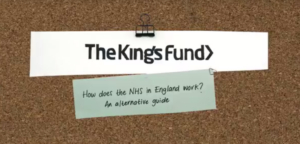Let’ start with a couple of questions…
Question 1: What can you buy for £147?
Question 2: What is the most difficult topic you can discuss?
Answers? How about; you can buy a TV license for £147 and discussing a colleague’s BO…
Or;
£147 buys you, roughly, a year’s primary care and the difficult conversation… talk to GPs about changing reimbursement formulae.
Visits to the RCGP and NAPC conferences tells me there’s an enduring enthusiasm, commitment and exuberance for delivering new models of primary care. A vocational pull and belief structure. Some say, the best job in the world.
Also, a dark shadow… our old-friend, sustainability.
It’s astonishing, <90% of first-contact healthcare, for >11% of the NHS budget.
Present arrangements are more or less the same as giving Sainsbury’s £147 a year and saying; I may come for some groceries, I may not. If I do, I have no idea when or how much stuff I’ll put in the trolley; it might be sixty quid’s worth, or £300.
With additions to include; the cost of buildings, infrastructure and stuff like the redundant QoF… that’s how it works. And, that’s why, last year, just under 100 practices disappeared; shut or merged out of existence.
If a shedload of patients decide to visit their GP and ‘fill their shopping trolley’ practices can’t cope. To make matters worse, becoming a GP is increasingly unpopular, fewer want to become practice partners and take on the risk of over-flowing shopping trolleys.
The problem; in business we’d call it over-trading. Defined as:
“…where a company does more business than its finances allow. It relates to the cash position… occurs when the organisation’s operations expand, with insufficient cash resources”.
Remedies include picking customers who will pay more and arranging for more funds. GPs can’t do that. Working-capital-ratios, income-to-activity goes down the pan.
It looks to me like most GP practices are heading in that direction. Don’t look to the budget for help. The wider NHS is in such debt, it is beyond the life of one parliament to fix.
The nub is demand and how it’s fixed.
Consider commuter demand. The solution has been to force all GPs to open longer hours, with the concomitant cost and staff pressures. The more sensible solution would be to create commuter access to GPs, where the commuters are going, not where they have come from, that means railway stations and offices.
Think shopping trolleys and it can’t be done. Think Amazon, they deliver anywhere. Think pop-up clinics in poorly doctored areas and forget it.
Open up data access and pay doctors and nurses by the number of people they see at Waterloo, or Manchester Central, or Lime Street, or Face-Time… is possible.
But… it’s like the BO discussion, who is brave enough to talk about it.
GP’s businesses are predicated on reimbursement mechanisms that are focussed on buildings and the hope that people won’t turn up and want a trolley full.
Innovations like dedicated eldercare services, specialist nurses, appointments screened by GPs, patients seen by other healthcare professionals… all happens now. But it is the exception. Take-up painful. Reimbursement, so difficult to unpack.
In the history of primary care, there have been important moments. The Collins Report, 1950, attacking quality. The 1966 ‘Charter’ opened the way for integrated practices. Since 1990, Fundholding has come and gone. In 2004 family practice disappeared; practice lists and the tangle of OOH started. We desperately need another ‘moment’.
GPs say they are busy. How busy?
There is no central data collection to tell us how many GP appointment slots there will be today, no way of knowing how many gaps. No way of diverting patients to practises with capacity and no way to reimburse the doc’s if we did.
Amazon use data; forecast demand, make sure they’re stocked-up with what we’ll want. Leverage data and reimbursement and we could do the same.
We guess at how many DNAs and there’s no way to find out why. Of the ones that attend, we’ve no real-time way to know what they wanted and was it fixed.
Change list-based practice and you could do all sorts of things; or would we be off our trolley.
———————————–
Contact Roy – please use this e-address
Know something I don’t – email me in confidence.
Leaving the NHS, changing jobs – you don’t have to say goodbye to us! You can update your Email Address from the link you’ll find right at the bottom of the page, and we’ll keep mailing.
———-
Disclaimer










